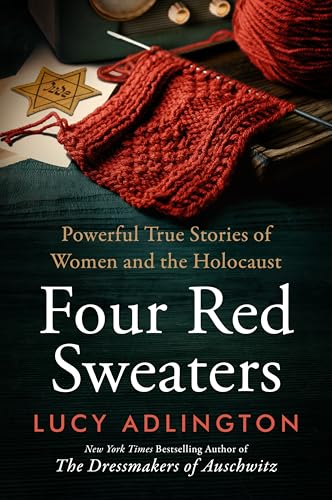Review of FOUR RED SWEATERS
by Johny McFliggen, PhD Literature & Business, Oxford
Ah, Lucy Adlington strikes again, this time with "FOUR RED SWEATERS," and it appears she's woven the red thread of history into an intricate tapestry of survival and identity. Adlington, renowned for her historical narratives that often drape themselves in the fabric of fashion, brings us a tale steeped in the monochrome world of the Holocaust, punctuated by the vivid red of four sweaters. Such stylistic choices are reminiscent of Spielberg's "Schindler's List," where a single spot of color disrupts the stark black-and-white reality, demanding our attention and empathy.
Adlington's penchant for fashion as a narrative device isn't just a gimmick here; it's a profound metaphor. The red sweaters serve as both literal garments and symbols of individuality, resilience, and, perhaps, defiance against the dehumanizing forces of history. The narrative structure is reminiscent of her previous work, "The Dressmakers of Auschwitz," where she masterfully intertwines the threads of personal stories with the larger tapestry of historical events. Here, however, the focus narrows onto these four Jewish girls, each carrying her sweater not as a burden, but as a badge of perseverance.
In terms of historical storytelling, Adlington stands shoulder to shoulder with authors like Heather Morris and Kristin Hannah. Yet, where Morris might linger on romance amidst terror, and Hannah dives into the emotional abyss of war-torn Europe, Adlington stitches her narratives with a unique thread—fashion. It’s a lens through which she examines identity and survival, offering fresh insights into an era often relegated to monochromatic narratives.
One must commend Adlington for not merely recounting history but for vivifying it with her meticulous research and her ability to animate the past through sartorial elegance. The red sweaters are not just garments; they are characters in their own right, each one telling a story interwoven with its wearer’s fate. Such an approach challenges the reader to consider how clothing can encapsulate memory, hope, and resistance.
In "FOUR RED SWEATERS," Adlington does not merely invite us to read about history; she cajoles us into feeling it—thread by thread. For those who have traversed the pages of her previous works or are familiar with similar thematic explorations by literary contemporaries, this book offers a nuanced perspective that is both intellectually stimulating and emotionally resonant. It is a reminder that history is not just about what happened but about what was worn, remembered, and cherished in the face of unimaginable adversity.
For aficionados of historical narratives that transcend mere recounting to become visceral experiences, "FOUR RED SWEATERS" is an essential addition to your literary wardrobe. Adlington proves once again that she is not just an author; she is a historian who sews stories that are as intricate as they are impactful.
Purchase Link: FOUR RED SWEATERS on Amazon
